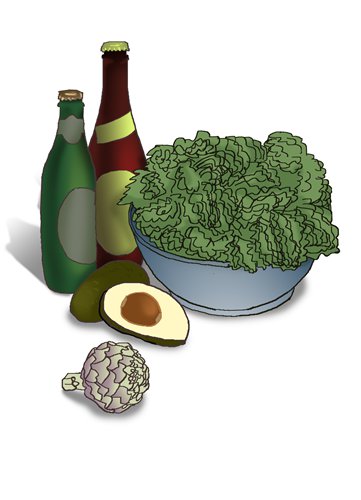
Illustration: Lu Ting/GT
If you live in Shanghai, you've probably noticed the rapidly rising number of discounted imported food shops springing up around the city in recent years. They tend to range in size from well-staffed outlets to tiny mom-and-pop boutiques, but their stock is nearly identical: German black beer, Belgium dark chocolate, Malaysian instant coffee, Swiss UHT milk, American chips... Look closer and you will also notice what else they share: forthcoming expiration dates.
That's right, these stores are essentially the world's dumping grounds for foodstuffs that big grocery chains from around the globe can no longer legally keep on their shelves due to their approaching sell-by dates. Not that there's anything wrong with that, as the food is still technically "good." I shop at these places often and can attest that their products are perfectly edible. And believe me, I'm happy about being able to buy a bottle of English IPA for 8 yuan ($1.17) that would cost me 80 yuan at an expat bar.
Chinese consumers' demand for imported food has been growing steadily - $58 billion dollars last year, up 25 percent year-on-year - as the standard of living in China rapidly improves, according to the General Administration of Customs, as reported by Xinhua News Agency on July 28. The EU remains China's largest supplier of food, and this is directly reflected in the assortment of exotic brands sold at these discounted imported food stores.
Previously, the only place you could buy imported food in Shanghai was at one of those ridiculously overpriced foreign grocery stores. Those venues made a killing by marking up their products 1,000 percent - and the wealthy expat moms who get their receipts reimbursed by their husband's company blithely kept them in business.
But no more! Supply now exceeds demand when it comes to foreign foods as China reduces import tariffs and simplifies its customs clearance processes. Formerly fancy foreign products such as fresh New Zealand milk, live Canadian lobsters, French cheese, Australian beef and European chocolates are now more competitive in the local market thanks to China's trade facilitation policies and growth of cold-chain transportation, according to a July 3 article in Xinhua.
The country's upgraded consumption habits also mean that foreigners are no longer the exclusive consumers of these products. A large concentration of imported food shopping is among Chinese, according to a new survey by iResearch Consulting Group, with 65 percent of purchases of imported food made online by 26-35-year-olds.
At established Shanghai imported food shops like Avocado Lady, Chinese are now seen side-by-side with blonde women stocking up on avocados and kale, which five years ago was unheard of. My observation of this phenomenon was confirmed in a July 15 Xinhua article, which credits increased trade with Belt and Road countries and regions for introducing produce like avocado, kale and artichokes to the Chinese palate.
"In 2011, China imported 31.8 tons of avocado, last year [2017] the figure hit 32,100 tons, an increase of more than 1,000 times," the report says. "It eventually won the hearts of middle-class [Chinese] foodies as it is rich in nutrition." A separate Xinhua article notes that China's avocado imports from Mexico, Chile and Peru in 2017 alone reached 30,000 tons.
China's flourishing food import market, a result of tariff cuts and easier access, is exactly what is driving the proliferation of all these small discounted imports shops sprouting up in Shanghai. And while many of these products will expire soon, rest assured that the General Administration of Customs is on guard. According to Xinhua, in 2017 the watchdog seized a total of 49,000 tons of substandard imported food products from 94 countries and regions.
Seeing imported foodstuff being sold in ordinary residential neighborhoods around Shanghai is a testament to this city's centuries-old commitment to free trade and shared prosperity. Additionally, a landmark project to further open up the nation's market to the world - the first China International Import Expo - will be held in Shanghai in November. I'll be going just for the free samples!
The opinions expressed in this article are the author's own and do not necessarily reflect the views of the Global Times.
